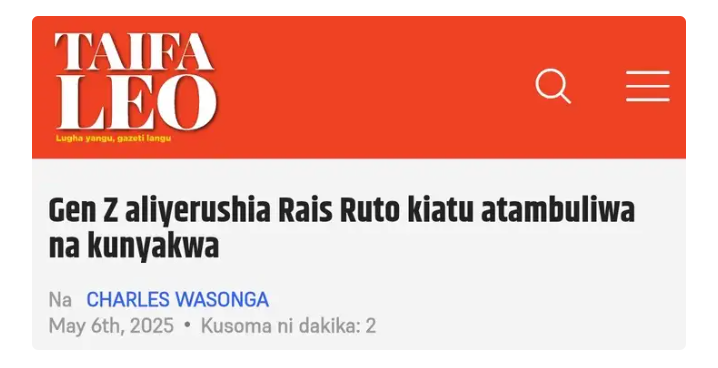Paul Mutongori Marwa, an 18-year-old from Kuria West in Migori County, found himself in serious trouble after he threw a shoe at President William Ruto during a public address in Migori on Sunday. The young Gen Z was quickly arrested and is expected to face criminal charges, this is according to the report by Taifa Leo.
A statement from Kehancha Police Station confirmed that Marwa was caught later that evening at Smile Bar in Kehancha town, where he had gone after the incident. His arrest followed a viral video that clearly showed him hurling a shoe at the President while he was speaking to the public in Kuria West constituency.Marwa was not alone during the incident.
Two other young men, Ezron Muhurai Mwita, 22, and Nicholas Sangonyi Mwita, 20, were also taken into custody. The two were accused of heckling the Head of State during his address, which disrupted the gathering.
All three are currently being held by the police and are helping with investigations as authorities try to understand the full story behind the incident.This incident is the first time President Ruto has faced a direct security scare in public since taking office on September 13, 2022.
Even though a shoe was thrown at him, the President did not panic. He remained calm and continued with his speech as though nothing had happened. This reaction was noted by many, but it did not stop security officials from taking the situation very seriously.
As a result, the President’s security has now been tightened, especially during his ongoing tour of the Nyanza region.

On Monday, just one day after the incident, President Ruto chose to address people from the roof of his official vehicle rather than standing on an open podium. Security officers, including heavily armed members of the General Service Unit (GSU), were seen forming a tight ring around him to prevent any further incidents.
The decision to change how the President engages with the public shows the seriousness of the situation and the concern about possible future threats.Marwa could face charges of attempted assault and disturbing the peace during a presidential function, both of which are considered serious offenses under Kenyan law.
If found guilty, the young man could face harsh penalties. While his exact motive is still unknown, the act has caused a wide conversation across the country. Many are debating what his actions say about how young people feel about politics in Kenya today. Some believe it was a sign of frustration from a generation that feels ignored, while others see it as a dangerous and disrespectful move.
Regardless of the reason, the incident has raised important questions about youth dissent, political expression, and how far people should go when expressing dissatisfaction.
